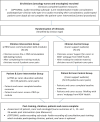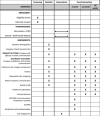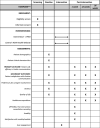eTRIO trial: study protocol of a randomised controlled trial of online education modules to facilitate effective family caregiver involvement in oncology
- PMID: 34049902
- PMCID: PMC8166623
- DOI: 10.1136/bmjopen-2020-043224
eTRIO trial: study protocol of a randomised controlled trial of online education modules to facilitate effective family caregiver involvement in oncology
Abstract
Objective: Informal family caregivers play a crucial role in cancer care. Effective caregiver involvement in cancer care can improve both patient and caregiver outcomes. Despite this, interventions improving the caregiver involvement are sparse. This protocol describes a randomised controlled trial evaluating the combined effectiveness of novel online caregiver communication education modules for: (1) oncology clinicians (eTRIO) and (2) patients with cancer and caregivers (eTRIO-pc).
Methods and analysis: Thirty medical/radiation/surgical oncology or haematology doctors and nurses will be randomly allocated to either intervention (eTRIO) or control (an Australian State Government Health website on caregivers) education conditions. Following completion of education, each clinician will recruit nine patient-caregiver pairs, who will be allocated to the same condition as their recruiting clinician. Eligibility includes any new adult patient diagnosed with any type/stage cancer attending consultations with a caregiver. Approximately 270 patient-caregiver pairs will be recruited. The primary outcome is caregiver self-efficacy in triadic (clinician-patient-caregiver) communication. Patient and clinician self-efficacy in triadic communication are secondary outcomes. Additional secondary outcomes for clinicians include preferences for caregiver involvement, perceived module usability/acceptability, analysis of module use, satisfaction with the module, knowledge of strategies and feedback interviews. Secondary outcomes for caregivers and patients include preferences for caregiver involvement, satisfaction with clinician communication, distress, quality of life, healthcare expenditure, perceived module usability/acceptability and analysis of module use. A subset of patients and caregivers will complete feedback interviews. Secondary outcomes for caregivers include preparedness for caregiving, patient-caregiver communication and caring experience. Assessments will be conducted at baseline, and 1 week, 12 weeks and 26 weeks post-intervention.
Ethics and dissemination: Ethical approval has been received by the Sydney Local Health District Human Research Ethics Committee (REGIS project ID number: 2019/PID09787), with site-specific approval from each recruitment site. Protocol V.7 (dated 1 September 2020) is currently approved and reported in this manuscript. Findings will be disseminated via presentations and peer-reviewed publications. Engagement with clinicians, media, government, consumers and peak cancer groups will facilitate widespread dissemination and long-term availability of the educational modules.
Trial registration number: ACTRN12619001507178.
Keywords: medical education & training; oncology; world wide web technology.
© Author(s) (or their employer(s)) 2021. Re-use permitted under CC BY-NC. No commercial re-use. See rights and permissions. Published by BMJ.
Conflict of interest statement
Competing interests: None declared.
Figures




References
Publication types
MeSH terms
Associated data
LinkOut - more resources
Full Text Sources
Other Literature Sources
Medical
